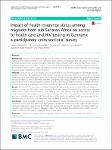Impact of health insurance status among migrants from sub-Saharan Africa on access to health care and HIV testing in Germany: a participatory cross-sectional survey
Müllerschön, Johanna
Koschollek, Carmen
Santos-Hövener, Claudia
Kuehne, Anna
Müller-Nordhorn, J.
Bremer, Viviane
Background
Among all newly diagnosed HIV cases in Germany in 2015, 16% originated from sub-Saharan Africa. Twelve percent of these infections were contracted within Germany and migrants from sub-Saharan Africa (misSA) are diagnosed later than Germans. Migrants, specifically those without health insurance, face many barriers accessing health care due to their residence status and cultural, socio-economic, legal and linguistic barriers. We assessed whether misSAs’ access to healthcare and utilization of HIV testing services depends on their health insurance status to inform prevention strategies.
Methods
From January 2015 to February 2016, we conducted a cross-sectional survey on knowledge, attitude, behavior, practice (KABP) regarding HIV, viral hepatitis and sexually transmitted infections among misSA in Germany. The survey was a community-based participatory research project; trained peer researchers recruited participants through outreach. To detect differences between participants with a regular health insurance card compared to asylum seekers with a medical treatment voucher or participants without health insurance or medical treatment voucher, unadjusted and adjusted Odds Ratios, chi-squared tests and 95% confidence intervals were calculated.
Results
A total of 1919 cases were considered. Overall, 83% had a health insurance card, 10% had a medical treatment voucher and 6% had no health insurance. Participants living in Germany for less than 5 years were less likely to have a health insurance card and more likely to have lower German language skills. Participants without health insurance visited a physician in case of health problems less often than participants with medical treatment voucher or a health insurance card (41.2% vs. 66.1% vs. 90%). Participants without health insurance reported less frequently visiting physicians or hospitals and were less likely to undergo a HIV test.
Conclusion
Having no health insurance or medical treatment voucher decreased the odds of contact with the healthcare system more than other socio-demographic characteristics. Furthermore, misSA without health insurance had lower odds of ever having done an HIV test than participants with health insurance. To increase health care utilization and testing and to ensure adequate medical care, all migrants should get access to health insurance without increasing costs and consequences for residence status.
Related Items
Show related Items with similar Title, Author, Creator or Subject.
-
2023-09-07ZeitschriftenartikelMental Health Surveillance in Deutschland Walther, Lena; Mauz, Elvira; Hölling, Heike; Thom, JuliaMit der Etablierung der psychischen Gesundheit als Public-Health-Thema wird auch ihre Surveillance (Überwachung) gefordert. Am Robert Koch-Institut ist daher eine Mental Health Surveillance für Deutschland im Aufbau. Die ...
-
2008-08-29Berichte und sonstige TexteReport: "Health in Germany" Robert Koch-InstitutLife expectancy is rising and the general health situation is good, but the number of people who smoke, are too fat, take too little exercise and/or drink too much alcohol is still too high. These are the main conclusions ...
-
2022-10-26Berichte und sonstige TexteNotaufnahmesurveillance Wochenbericht 01.01.2022 - 23.10.2022SUMO TeamSUMO ist ein am Robert Koch-Institut entwickeltes und betriebenes System, welches Gesundheitsdaten für Public Health-Surveillance verarbeitet und bereitstellt. Der Notaufnahmesurveillance Wochenbericht enthält Daten der ...

